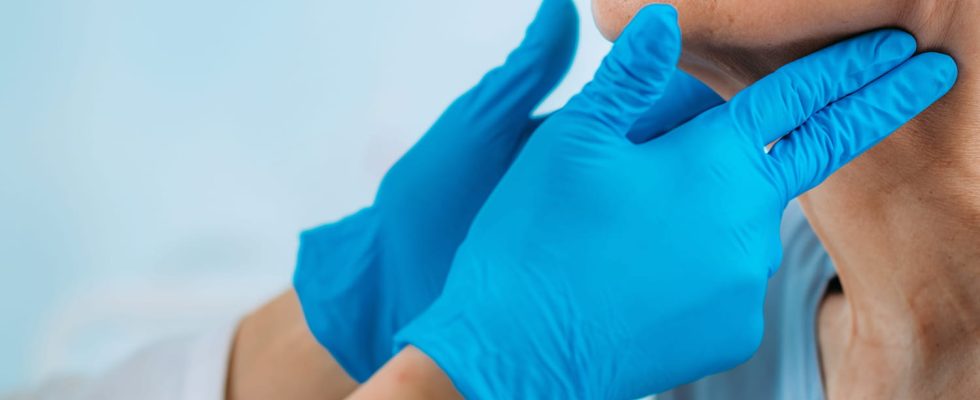Thyroiditis refers to inflammation of the thyroid gland. There are several types, but the most common is Hashimoto’s thyroiditis. What are the warning symptoms? The diagnosis ? The treatment ?
Thyroiditis is inflammation of the thyroid gland. There are different types that are of different origin (autoimmune, viral, parasitic, infectious) and cause different symptoms. The most common is Hashimoto’s thyroiditis: of autoimmune origin, it mainly affects women. What are the symptoms of thyroiditis? What are the consequences ? How to treat it?
Definition: what is thyroiditis?
Thyroiditis East inflammation of the thyroid. It should be considered carefully, as it may cause destruction of the thyroid and so the disappearance of thyroid hormones in the body, which has many functions. It is most often caused by the production of antibodies against the own tissues in the context of autoimmune thyroiditis (Hashimoto), but may in some cases be of infectious, viral or parasitic origin (subacute De Quervain, Chagas disease).
What is autoimmune thyroiditis?
There are several types of thyroiditis including autoimmune thyroiditisdue to the destructive action of thyroid cells by the body’s own cells, the most described forms of which are Hashimoto’s thyroiditis And atrophic thyroiditis.
What is De Quervain’s subacute thyroiditis?
Thyroiditis subacute of De Quervain is assumed to be of viral origin. It appears suddenly and is marked by severe pain in the front of the neck, often associated with flu syndrome (fever, fatigue) and hyperthyroidism.
What is parasitic thyroiditis?
Thyroiditis parasitic or Chagas disease is caused by the parasite called Trypanosome.
What is painless postpartum thyroiditis?
It is an autoimmune thyroiditis which remains rare and which is characterized by the appearance of moderate hyperthyroidism after childbirth, with goiter and an absence of iodine uptake by the thyroid.
What is acute thyroiditis of infectious origin?
It is a very rare thyroiditis which is due to infection by a staphylococcus, a streptococcus or Koch’s bacillus (agent of tuberculosis). It is characterized by a painful thyroid abscess that should be drained by surgery and treated with antibiotic therapy.
What is Riedel’s fibrous thyroiditis?
It’s thyroiditis of unknown origin. It is exceptional and can, in the absence of surgical management, progress to asphyxia by compression of the trachea.
What are the symptoms of thyroiditis?
As a rule, thyroiditis is manifested by an increase in the size of the thyroidwith the characteristic shape in important cases of a goiter, a kind of swelling located at the base of the neck. Goiter itself can be responsible for symptoms due to compression on nearby organs: it can lead to:
- difficulty breathing,
- eating disorders,
- swallowing disorders.
Furthermore, depending on the action generated by thyroiditis on the thyroid gland, the symptoms may be those of hyperthyroidism or hypothyroidism. Mostly the symptoms are those ofa deficiency in thyroid hormones with in particular weight gain, constipation, nervousness, muscle cramps, bradycardia… But in the case of De Quervain’s thyroiditis or in the initial stages of most autoimmune thyroiditis, hyperthyroidism and its clinical signs are present.
If thyroiditis is suspected, a TSH test, a hormone normally stimulating the secretion of thyroid hormones by the thyroid gland, makes it possible to define the state of hyper or hypofunction. Afterwards, an ultrasound is frequently performed in front of a goitre. Research on a blood test for markers of inflammation or antibodies specific to autoimmune thyroiditis is also often necessary to confirm the diagnosis.
What treatment to treat thyroiditis?
Thyroiditis of infectious origin calls for specific treatment of the germ or parasite in question. In cases of significant hypothyroidism, hormonal treatment, allowing the supply of thyroid hormones to supplant the non-functional gland, is necessary.
There is no particular prevention of thyroiditis.
Thanks to Doctor Alain Scheimann, endocrinologist and author of What if it was the thyroid? (In Press, 2017) for its medical validation.
